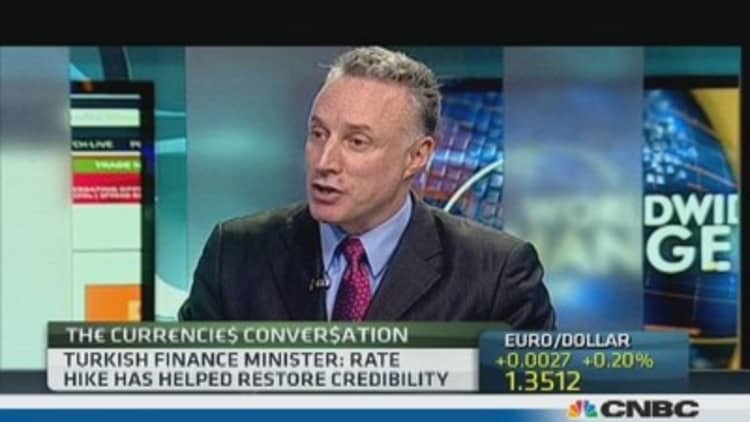
Turkey's finance minister acknowledged to CNBC that when it comes to rule of law, his country's reputation is in need of repair.
"We will address rule of law and the business community," Mehmet Simsek said Monday. "Unfortunately, we've had a few experiences that do not reflect well, and we are aware of that."
The country's currency has fallen dramatically in the wake of a political scandal that erupted in mid-December and involved numerous arrests and interventions within the judicial and legal systems.
The U.S. Federal Reserve's recent decision to taper its asset purchases has hurt nearly all emerging market currencies, Turkey suffered one of the worst selloffs. The Turkish lira has fallen 30 percent since May, a decline also driven by political drama within the country that has unnerved investors.
Simsek insisted—not for the first time—that the country's central bank is independent from political influence.
"We have to be pragmatic," he said. "The most important thing for us is central bank credibility and its independence, because it's a challenging global backdrop, challenging global environment, and I have to deal with that."
There were questions about the Turkish central bank's independence when it initially chose not to raise interest rates in the face of a sharp selloff in the currency. The subsequent drop was so sharp that the bank reversed course, declared an emergency meeting and announced a massive rate hike in the middle of the night last week.
The currency has since stabilized at roughly 2.26 to 2.27 lira to the dollar.

In the minutes to the meetings released a few days later, the bank said that it would act in an even more aggressive fashion if necessary.
When asked if Prime Minister Tayyip Erdogan would tolerate a possible recession from a hawkish central bank, Simsek said, "We have to live with more moderate growth, partly because of [the]global backdrop, partly because of recent developments domestically. So we are realistic policymakers. …"
"More moderate growth" may be an optimistic goal.
Neil Shearing, chief emerging markets economist at Capital Economics, told CNBC after the interview that it's possible the country could slip into a recession.
—By CNBC's Michelle Caruso-Cabrera. Follow her on Twitter @MCaruso_Cabrera


